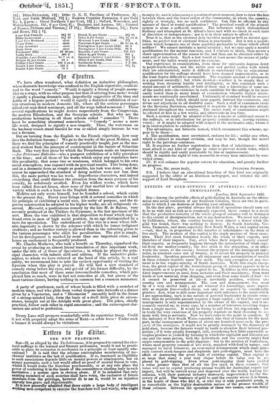Itthro to *t
THE NEW FRANCHISE.
Sin—If, as alleged by the Yorkshireman, it be proposed to extend the elec- toral suffrage to the learned and literary professions, would it not be practi- cable to place its extension to mechanics on a principle at least equally edu- cational ? It is said that the scheme contemplates membership of me- chanics' institutes as the test of qualifiestien. If so, inasmuch as eligibility to such associations depends little on mental powers or att*inmeuts, but on money payments, such a test would afford no proof of mental fitness to vote, whilst it would make the franchise purchaseable, or at any, rate place the power of conferring it in the hands of the committee or electing body in each institution ; a system open to obvious abuse. If it be intended that only existing members of such societies shall have votes, the exclusion of future Members from the privilege, however fit to use it, would be an injustice Namely less grave and objectionable.
It is now generally admitted that there exists a large body of intelligent working men competent to exercise the franchise well and wisely, who ought
1S1; Ditto Extension,. 131 ; Ditto G. N. E. Pm-Mate' of -Preference, 51; to enjoy it; and it is becoming a question of great moment, how to draw the line York and forth Midland, 191 • Eastern Gauntlet Extension 6 per Cent between them and the lower orders of the community, in whom the country. No. 1, 1 prat. ; Great Wolverhanpton, 151., 6 of France, (Orleans and
rightly or wrongly, has no such confidence. Can this be effected by any manner of fiscal or rental qualification ? The practical result of the present system is alone a sufficient answer. The influences which disfranchised Sudbury and triumphed at St. Alban's have met with no check in such tests of discretion or independence ; nor is it in their nature to afford it.
True it is, that as the electoral duty involves moral as well as mental qua- Utica, no perfect test of electoral fitness is practicable. But is not a qualifi- cation which bespeaks one of these qualities preferable to those which afford neither? We cannot institute a moral scrutiny; but we may apply a mental qualification for the mental function, and, I venture to think, thus secure a closer approximation of the means to the end than can be obtained either by rent-roll or rate-book. Such a test would at least secure the means of judg- ment, and the ballot would protect its exercise. Our experience in examinations, from those for university degrees down to pupil-teacherships, and the entire ease and perfect justice with which they are administered, make it difficult to understand why an educational qualification for the suffrage should have been deemed impracticable, or in the least degree difficult to accomplish. The requisite amount of attainment is a question assuredly ; but when decided—whether it be simply that of writing from dictation legibly and intelligibly, or this combined with a stated amount of arithmetic, or both of these and a knowledge of some one of the useful arts—its existence in each candidate for the suffrage is far more easily tested than in many kinds of examination whereby higher attain- ments are continually ascertained. Uniformity of standard would be secured by a central board, which should issue papers, instruct the examiners, and revise and adjudicate in all doubtful cases. Such a staff of examiners exists in the Revising Barristers, augmented if requisite by the inspectors already stationed throughout the country. The entire work of examination might be effected at first in a few weeks, and afterwards in leas time.
Such a system might be adopted either as a means of additional access to the suffrage, or in substitution for property qualifications, (saving existing votes) ; or it might be adopted with respect to the mechanics only, whom it is in contemplation to enfranchise.
The advantages, not hitherto named, which recommend this scheme, ap- pear to be these—
I. The qualification, once ascertained, endures for life ; unlike any other, which is subject to constant revision, and may he lost, though the moral right to the privilege continues. IL It requires no further registration than that of inhabitancy ; which must attach to any kind of suffrage in order to prevent double votes, which should be rigidly and easily punishable by fine or imprisonment. III. It renders the right to vote accessible to every man untainted by con- victed crime.
IV. It will enhance the popular esteem for education, and greatly further its p
nirealsi., Sir, yours truly, JELINGER SYMONS. P.S. I believe that an educational franchise of this kind was originally suggested by the editor of an Aberdeen newspaper, and enlisted the able support of Lord Brougham.


























 Previous page
Previous page